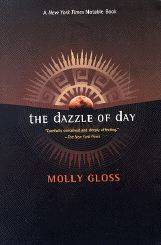

| Click on a book's image or title to order from Amazon.com |

The Dazzle of Day
Tor Books, HC, © 1997, 254 pp, ISBN #0-312-86336-5Reviewed July 1997
I picked up this book because Borders Book Store suggested that it was similar to Mary Doria Russell's outstanding novel The Sparrow. In a superficial sense, it is: The Sparrow involved the Society of Jesuits sending a mission to initiate first contact with an alien race at Alpha Centauri. The Dazzle of Day focuses on a group of Quakers (apparently from Central or South America) who leave Earth in an artificial habitat to colonize a planet. There, however, the similarity ends.
I was disappointed to find The Dazzle of Day to be an immensely tedious book, written in a dreadfully florid style, and whose plot goes nowhere. While there are a few moments of genuine beauty in Gloss' prose, and some genuinely intriguing notions along the periphery, I did not enjoy the book and finished it with relief more than anything else.
The novel has a prologue which takes place on Earth, a rather touching piece involving an older (60-ish?) woman considering everything she'll be leaving behind when she joins her fellows on the journey, and an epilogue, a rather dry sequence taking place on the brave new world a few decades after it's been colonized, involving the crash of an airship as it returns from cannabalizing part of the interstellar vessel. But the majority of the story takes place on the vessel, the Dusty Miller, a few weeks before it stops to orbit the new world.
I suppose Gloss' intention is to examine the inhabitants of the Miller after two hundred years of travel: What they think about their world, their concerns about the new world, the dangers they'll face, and so forth. But the third person narrative (as opposed to the first person prologue and epilogue) is told with such restraint and coldness that we get only the most measured and intellectual (and often, scatalogical) examination of the several protagonists. There are endless asides, monologues and dialogues, and numerous tragic events (one character commits suicide, another has a seizure) which do little but paint the world as a dismal and bleak one in which to live.
It's possible that I'm missing a big chunk of the point, as Gloss paints Quaker society on the Miller as a quiet and placid one, given to slow decision-making and striving for personal and group fulfillment in simple ways. But whereas Russell in The Sparrow does an outstanding job of describing the Jesuits for the unenlightened (including crusty agnostics such as myself), Gloss only provides what seems a brief glimpse of the Quaker way of thinking, and so it's hard even to consider the protagonists as people, much less ones we care about.
The Dazzle of Day fell flat for me in almost every way; it contained little dazzle of any sort. I cannot recommend it.
hits since 13 August 2000.